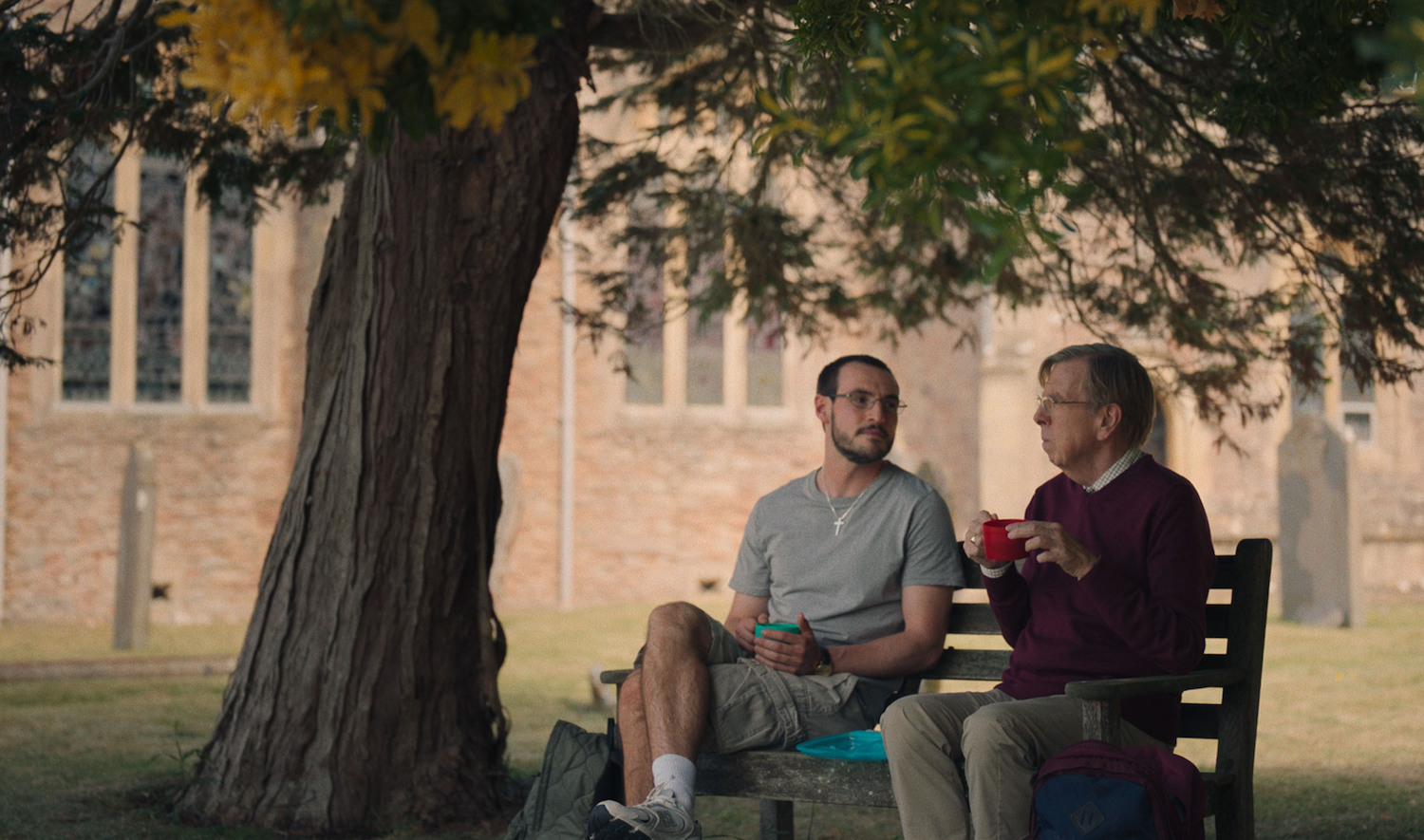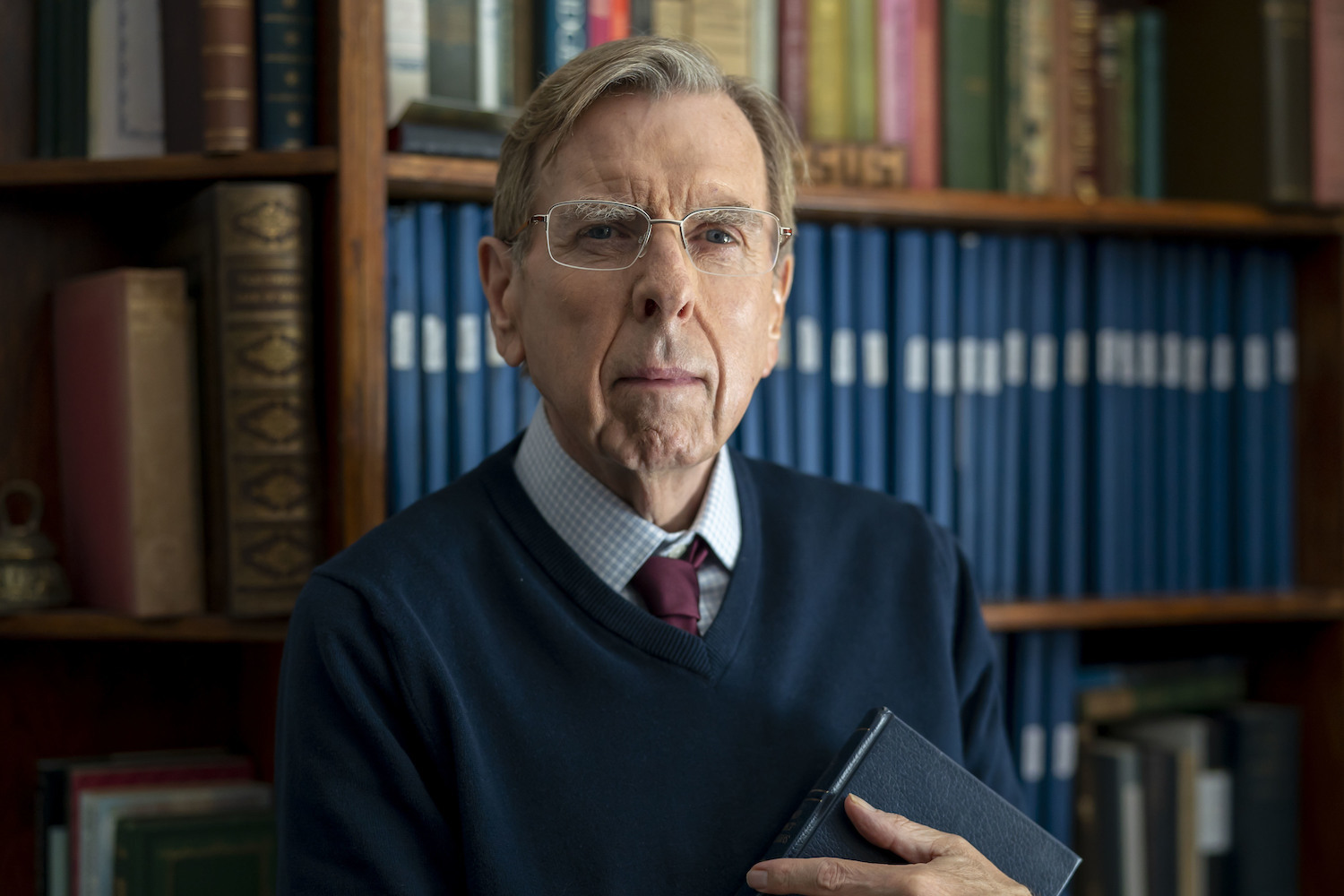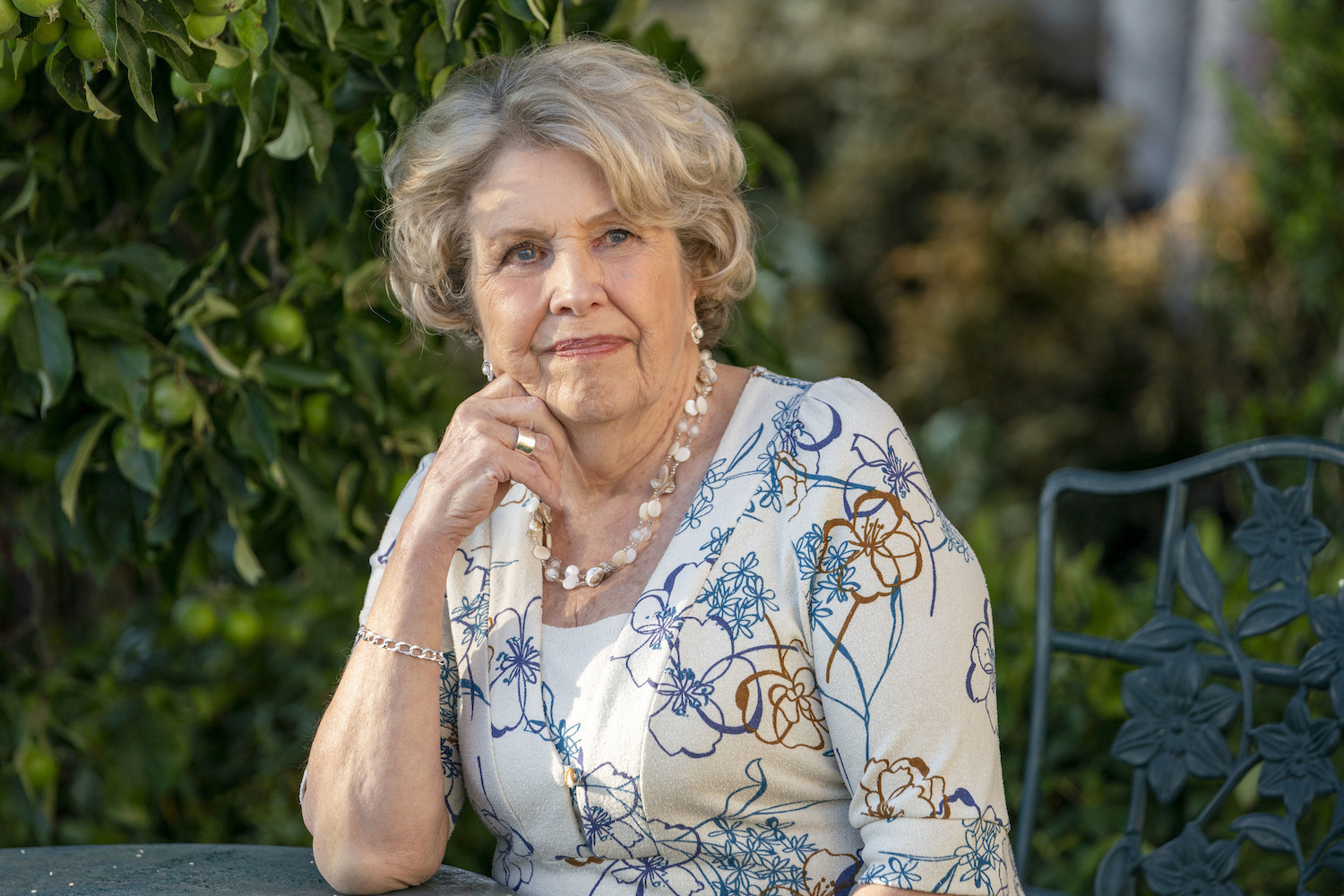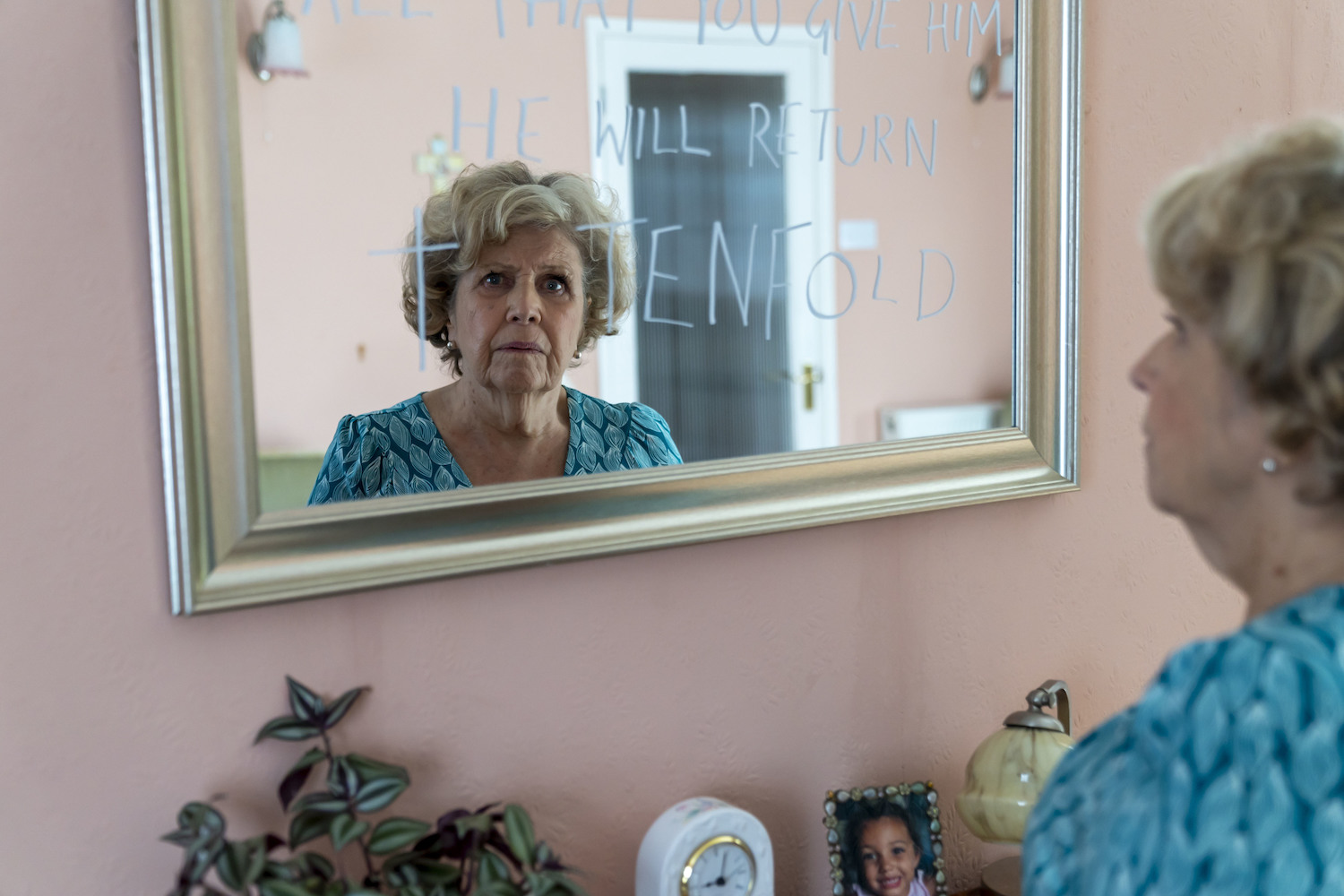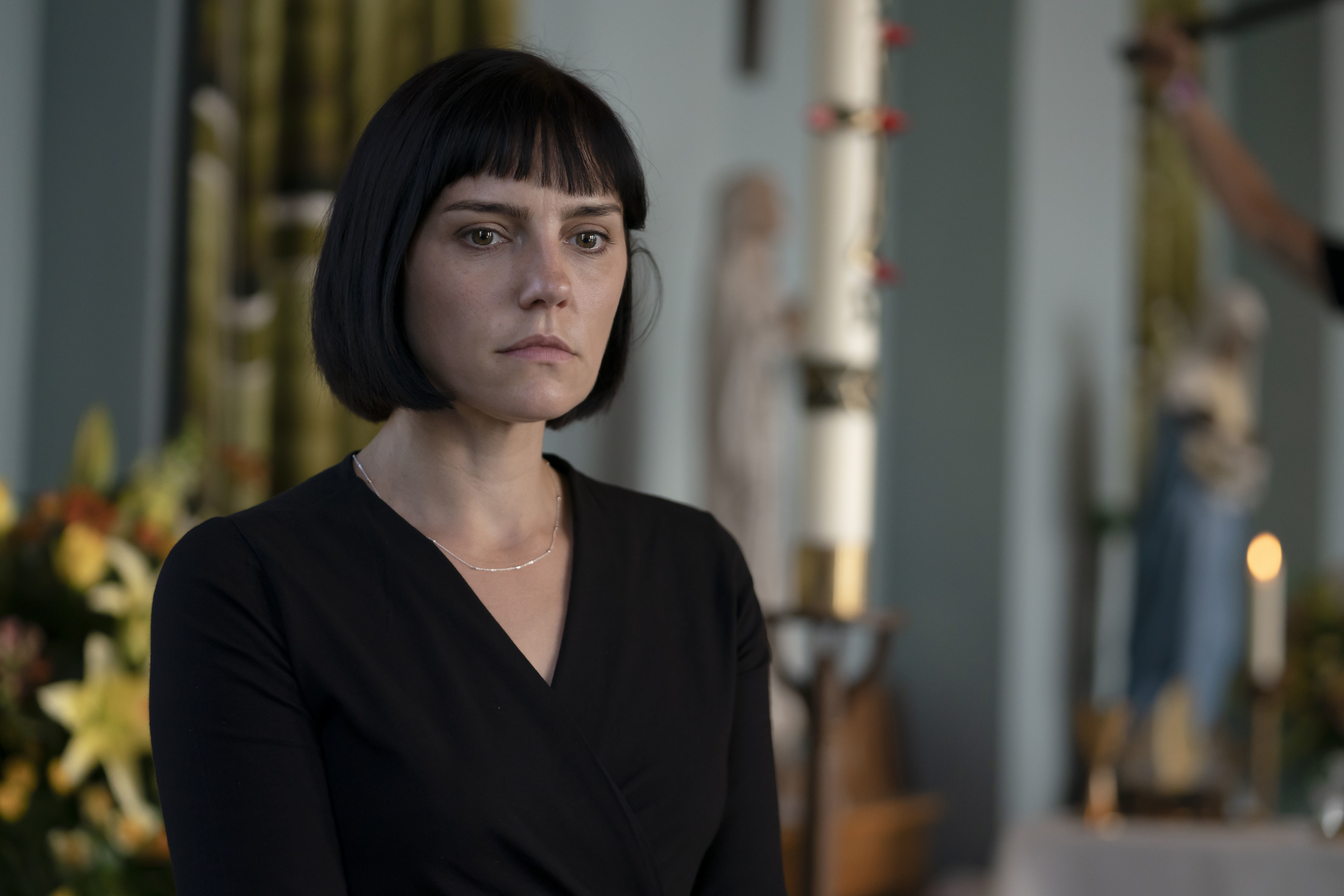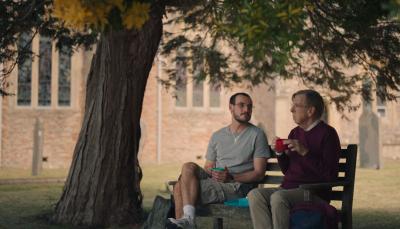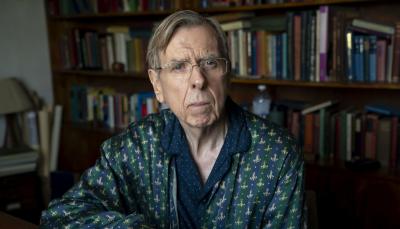'The Sixth Commandment': Sarah Phelps and Saul Dibb on Finding the Light In a Dark True Crime Story

Éanna Hardwicke and Anne Reid in "The Sixth Commandment"
(Photo: BritBox)
American audiences are likely first learning about the tragic deaths of Peter Farquar and Ann Moore-Martin thanks to the BritBox true crime drama The Sixth Commandment. The four-part series dramatizes the crimes of Ben Fields, a charismatic student who drugged, gaslit, and finally murdered Farquar, in Buckinghamshire in 2015. (And attempted to do the same to his neighbor, Ann Moore-Martin almost immediately afterward though her demise was ultimately determined to be of natural causes and not due to the poison he'd given her.)
It’s an awful story of isolation and loneliness, but writer Sarah Phelps (The Pale Horse) and director Saul Dibb (Bullet Boy) manage to tell it in such a way that it never feels exploitative. Instead, the series is warm and compassionate down to the ground, reminding us that this isn’t the story of one monster’s crimes, but a reflection on the lives of his victims—who they were, what they they believed in, how they loved, the lives they each touched, and the memories they left behind.
We had the chance to chat with both Phelps and Dibb about how they approached telling the story of such a recent crime, the thematic and visual throughlines that ground the series, and how they wanted to give Fields' victims back the grace and hope he so brutally stole from them both.
The following interview has been edited and condensed for clarity.
Telly Visions: As an American, I knew almost nothing about the story outside of what I found on Wikipedia. So I guess my first question for you guys—and I'm told that this process was very collaborative between the two of you— is, why did you want to tell this story?
Sarah Phelps: There was a documentary made in Britain about the investigation into Peter Farquhar’s murder and the documentary makers followed Thames Valley Police for several years. It was a very good documentary, and then the maker of that, Brian Woods, met up with Derek Wax, who was the executive producer [of The Sixth Commandment], and Derek had actually been taught by Peter Farquhar when he was at Manchester. They said, well, maybe there's a way of doing this as a drama, and took it to the BBC and then they came and talked to me about it.
I kept thinking…I don't know, do I want to do this? Because it is a very bleak story. And then as I was reading some of the initial research, I thought: it's a fairy tale. It's like a grim fairy tale. And it's a love story. [Peter] thinks he's falling in love. And how cruel that all was. It made me think of how you can have this life where you go to church where you're a devoted practicing Christian, but you keep a huge part of yourself—your sexuality—a secret, and it troubles you deeply. You pray that God will send you some sign that you could be happy. And you go to your book group, you go traveling and you have your friends, but you pray and you pray and you pray because you are so lonely.
It kept making me think of someone spelled into a dark forest full of thorns, wishing and hoping that a beautiful prince will hack their way through the thorns and you get a kiss. I thought, I’ve really got to tell it like a fairytale. I want to be able to see Peter falling in love. I wanted to see how this intelligent man was gulled by this young man because he prayed to God for somebody to love him, and now here was Ben. He was a manifestation of God’s love. So it’s very complex.
That’s why I wanted to tell the story—I thought it was a really important one about loneliness and wanting to be loved. And I also thought it was a really important story about narcissism, and egomania and about how people can walk amongst us and sometimes we need to look at people who are too perfect very closely. It was about diligent coppers, and it was about a really good, really good prosecution case. But ultimately, it was about a story about grace. I didn’t want to see things through the eyes of the killer. I didn’t want to imagine [Fields] as being possessed of a greater intelligence. And I wanted to give Peter and Ann their lives back. And I wanted them to have their grace back. And I didn't want them to become the sum of the violations that had been done to them.
Saul Dibb: You did an unbelievable amount of work. Not just marshaling all the information, but I just think you had a kind of clarity about how to tell that story. For me, I read the first episode and thought, this is about yearning for love. That huge Achilles heel that [affects] everyone, but if you’re old and lonely, you’re particularly vulnerable. Love is what allows Ben reel Peter and Ann Moore-Martin in, but love is also what drives Anne Marie Blake to discover what’s actually been happening so there’s kind of a double-edged sword going on, all the way through.
It is a true story, but I don’t think it at all sits within what people call the modern true crime genre. I think it’s almost anti-that, personally. But where Sarah’s reference was fairytales mine was actually—I went straight to watch Gaslight, the 1940s film. And those 1940s and 1950s films really get it, they really are brilliant about how they create a sense of danger and tension in the most mundane and domestic settings. So I think Sarah and I both came at it from slightly more unusual angles.
Telly Visions: One of my questions for you, Saul, is…I feel like when you look at stories like this, a lot of the time people tend to expect it to be very sensationalized, very dramatic. We like to see the worst things play out on screen. But it feels like there was a very deliberate choice in the lens [this series] chooses to view its story through, one that’s more focused on overall humanity. Ben is not the camera or the story focus.
Dibb: That was in the DNA of Sarah’s scripts. I was just so moved by the first episode—by Peter Farquhar, his story of falling in love, just him as a character. How difficult his life was even in such a modern age, to have to be forced to be a closeted gay man because he was such a big believer in the church and how difficult that all was for him. To feel that he was falling in love with someone for the first time was in itself such an extraordinary and powerful story. That he has such trust and faith and is then so betrayed.
I found myself really interested in the concept of, I suppose, a kind of poisoning. [Peter and Ann] are literally physically poisoned. But that poison then spreads out and starts to affect everybody else who's close to them. So it's not just looking at the impact on the people who are directly involved, but also their families and how that puts pressure on strain on them and their lives become more and more difficult because of the malevolent practices of one person.
I think it was absolutely the right decision of Sarah’s right from the off to put [Ben] always there, but he's in the background. And I have to say, to Éanna’s credit, he is brilliant.
Telly Visions: He’s so good. And fully terrifying.
Dibb: He is always there, always watching. always code-switching depending on whoever he's talking to, while he still remains a mystery. It is a really, really brilliant thing.
Phelps: It's such a balancing act of a part. It’s incredible what he does, and it’s such a subtle performance. It’s quite extraordinary.
an integral part and it's, it's incredible what he does, that he that it's, you know, really is a balancing act, and you have to be it's such a subtle, subtle performance. It's quite extraordinary.
Dibbs: And he's such a lovely, charming, funny man!
Telly Visions: I feel like that's always the way it goes with whoever plays these terrible monsters onscreen is always the nicest person! I don’t know why!
Telly Visions: One of the things I really loved about this series, and you've both spoken a little bit about it already, is…I think kind in our media and our entertainment nowadays it’s kind of the done thing to not take the idea of faith all that seriously.
I feel like there’s a version of this story that would have used their belief as an excuse for [why] these two people fell for—-like it made them gullible or less likely to be able to suss out how bad a person like Ben was for them. But this series never looked down on Peter or Ann and that [respect] really threads throughout the whole show. Every character’s life is informed by their faith and this belief structure they have. I would love to hear a little bit about how you guys approached that.
Phelps: You're not the first person to say that; lots of people have said that they were surprised by how seriously faith was treated. But I’m all—-why would I do anything that would belittle these characters and what they believed? It is central to who they were as people, it’s what made them outward-looking. Their faith didn’t make them silly or insular or able to be gulled. It was what made them curious. It was what made them generous. It was what made them honest and open.
Peter’s family are very devout Christians, and Ann Moore Martin as a very devout Roman Catholic, and my mum’s a very devout Roman Catholic and if she caught me, you know—there was absolutely no way on God’s green Earth! But, more than that, it’s really about a way of positioning: their curiosity, their love of language, their love of poetry. Their love of and belief in prayer, their belief in the inherent goodness of what the world can offer, or their inherent belief in the light of the world, to sort of put it like that.
Similarly, the police investigation has a profound— at the time in Britain when I was researching this, there were some terrible things that were happening with the Metropolitan Police Force, so it was a relief to find really diligent, courageous serious coppers doing some absolutely brilliant coppering. But there is a profound belief system there too, that when you get all the evidence, you will be able to get your man also with the prosecuting barrister, there is a profound belief in the process of the law.
So there are all kinds of like, important faith structures, but I could only ever think that what was central to Peter's heart was his love of the Anglican faith and his absolute adherence to it. The Anglican faith would not admit his homosexuality but he didn't turn his back on his faith because of that. He just tried to find a way through it, to try and heal that fracture in himself. And Ann Moore Martin was—she’s got a bit in there where she’s having Ben read John Donne to her because she loved those poets, those great incredible poets full of faith and the terror of God and the love of God. There's no way I would have not taken it absolutely seriously. It was part of who they were.
Telly Visions: The first two [episodes] of this series are very different tonally than the last two, which follow the more procedural aspects of the story. Did either of you approach those halves differently in terms of framing or shooting the story? Each piece feels very different but also still as though it’s part of a whole.
Dibb: That’s one of the exciting things for me as director and also one of the challenges is how to maintain a look and a tone throughout the whole thing. Because there is a big shift.
I do think you could release them both as two films—there is they are different things. But I didn't actually think well, we're going to shoot it differently as much as I was interested in actually thinking about the kind of journey of the light. You’ll notice the first two [episodes] take place in this beautiful English summer. And there's a kind of freedom and romance associated with that. We were very careful with how we shot it and when we shot it. It had this sense of beauty about it. And then as it goes through, it progresses until you're in the most sallow, yellow, fluorescent lighting courtroom dungeon. And I felt, as Ben’s life caught up with him, as his world narrowed, it became darker and darker.
Phelps: Saul and I had a really early conversation about the journey of light. What does an Anglican light look like as opposed to what a Catholic light looks like as opposed to the flickering fluorescent lighting bars in the police [scenes], which is very kind of municipal and you know, cost-effective. And then what the courtroom looks like, which is very harsh, what the lighter prison cell looks like. We had these really big conversations because in a way, what Saul says is absolutely right. And it was all part of the kind of the planning of it.
You’re always thinking about it: What is that thread that ties through [everything]? Of course, the families go through [the whole series], the diaries go through it, Ben goes through it. But the light is really important. One of the things that you come out with at the end, at the very end is that sense of flickering sunlight as Peter was laid to rest a second time. And it was important to sort of say—you can go down to Hades, but you must come back up again.
Dibb: I think also we were lucky. What we were making was a four-hour film separated into four separate films. With a lot of series, it's a continuation of the same kind of storyline [throughout]. Here, some characters' stories end at the end of an episode, new stories begin, and it's always shifting. I liked that challenge of kind of beginning again but at the same time telling the same story.
Phelps: I also thought about it like seasons—spring, summer, autumn, winter—so that it was all part of the same year. Even at the very beginning when I was thinking about the structure, it was Peter, Ann, police, court. That was the structure I wanted to tell it in and I wanted it to keep shifting all the time, so you didn’t [feel] you’re constantly going round in the same circle.
Dibb: You start off with two characters, then it’s four, then it’s eight—in a way there’s this snowball effect going on.
Phelps: And it needs to multiply as it starts to pull in so many more people and you can see the impact constantly rolling out, like you throw a pebble in a pond, and here are the ripples.
Dibb: It’s also worth remembering this is a story about the very early days of a young man involved in the deaths of these two people, and what might have happened had you not had this extraordinary niece say hold on a second. Something's up
Phelps: And to be so bold and brave and courageous and fearless as to confront him! She did drive through the night, she did know something was wrong. She drove through the night and found a dark house where all the lights were off and her aunt on the floor. And you know, that kind of courage, to literally look him in the eye and say what are you doing? I've described her several times as being the bearer of the lantern—when you have a dark story, you need somebody who holds the lantern high. This is the beating heart. This is what love is. In a story that is about the really curdled version of love that Ben Fields offered people, a really manipulative and calculated version. Here is what real love is and it blazes and it is fearless.
Telly Visions: I wanted to make sure to ask you, Sarah, specifically, because I feel like you’re more known for your Agatha Christie adaptations, which are, of course, whodunnits, but The Sixth Commandment is really more of a whydunnit, there’s not a mystery of who committed this terrible act.
Phelps: It’s a very recent case—the trial was only in 2019. Literally a year before we all went into lockdown. So it’s very very recent and even in the lead-up to transmission Ben Fields was again appealing his sense. It got knocked back, but he was still appealing. So it’s still “live”, as it were.
So I think I had the same thing in mind as when I’m doing the Christies, which are very, very famous and you have to find some way of telling the story so that the audience forgets the ending. In a way, you need to do the same thing here. You have to find a way to tell it so that it’s fresh, so that it’s shocking but you still want to watch it and you are still desperate for justice to be done. Even though, at the back of your head, you know that justice was done, you’re caught up in it.
That’s the challenge to either doing an Agatha Christie or a Charles Dickens, or a story like this. It has to make people forget that they know what the end is. And you have to do it by coming at it from a different angle. So you're just not retreading the same ground and throwing the same shapes pointlessly, you've got to really get into the blood of the characters and that means really bringing the people who lost their lives, returning them to life and giving them their grace.
Dibb: I think there's a power also when people do know the ending because it does create a sense of a terrible dread. You're falling in love with these people and also worrying for them at the same time.
Phelps: But you’ve got to understand how Peter fell in love with [Ben], how Ann fell in love with him. You don’t want your people to look foolish. You want to understand how this happened. And that doesn’t mean understanding Ben, it means understanding Peter and Ann. Really understanding them. Not just the vulnerability of being elderly and lonely but the vulnerability of being curious and, even though you are in your late 60s or early 80s, still being hopeful for the next stage of your life, that somebody could hack their way through the forest and wake you with a kiss.
The Sixth Commandment is now streaming on BritBox.

